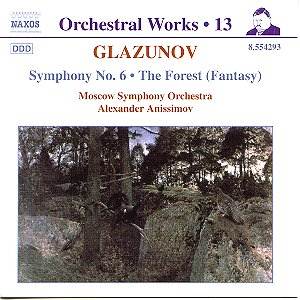ALEXANDER GLAZUNOV (1865-1936)
Symphony No.6 in C minor,Op. 58. The Forest, Op. 19.
 Moscow Symphony
Orchestra/Alexander Anissimov.
Moscow Symphony
Orchestra/Alexander Anissimov.
 Naxos 8.554293 [DDD]
[59'10].
Naxos 8.554293 [DDD]
[59'10].
Crotchet
Amazon
UK
Amazon
USA

Reckoned by Rimsky-Korsakov, on its first performance, to be the highest
point in Glazunov's development, the Sixth Symphony is from Glazunov's years
of maturity. The first movement is given a cracking performance with the
brass granted a saw-toothed edge and some satisfying presence. The Brahmsian
breadth of melody at 8.43 (track 1) needs more lift and drive. Rather like
Bax (himself a fan of the Russian's music) Glazunov benefits from keeping
the momentum up. The recall of Tchaikovsky 4 is palpable in the clash of
the last pages of the first movement. The theme and variations are frankly
undistinguished - not Anissimov's fault. The musette-like Intermezzo
is kin to the lighter ballet music like The Seasons. The finale is
triumphant without the angst of Tchaikovsky. Its tramping victory may recapture
Rachmaninov's First Symphony but it would have benefited from tenser direction.
The Polyansky series on Chandos also suffers in this way. Järvi,
Rozhdestvensky (Olympia) and, if I recall correctly, from an old EMI-Melodiya
LP, Fedoseyev, have a better grip. I noted a strange bump (edit presumably)
at 5.22 in the first movement.
The Forest is called a 'fantasy' but it is simply another rather good tone
poem like The Sea. The writing is inspired - strong on arboreal shadows
and shafts of sunlight. The orchestral fabric is of a satin transparency
and the themes are liquid. Works such as this laid the foundations for French
impressionism and for the works of Delius and Bax (Nympholept and
Happy Forest). This is at the same time one of the composer's most
nationalistic works (Borodin and Rimsky hallmarks).
Decent notes by Marco Polo/Naxos stalwart, Keith Anderson whose name has
graced their releases since their entry in the lists in the early 1980s on
LP.
A decent entry in the Naxos Glazunov series (vol. 13) - strong for The
Forest and the first movement of the symphony.
Reviewer
Rob Barnett

See also reviews by Ian Lace and Colin
Clarke
